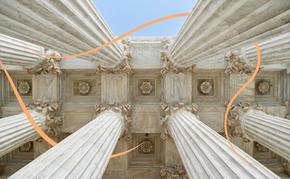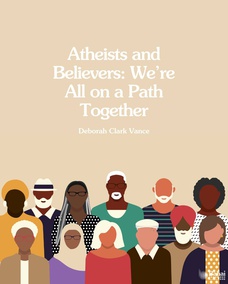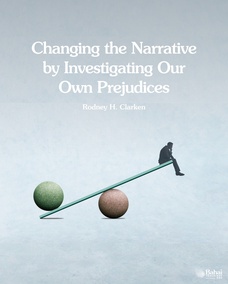The views expressed in our content reflect individual perspectives and do not represent the authoritative views of the Baha'i Faith.
I once met a guy who believed no one had any authority over him. He rejected civil law, international law, religion, and even the authority of the local police force.
He refused to get a driver’s license, register his car, and pay property or income taxes. He never bought brand-name goods, because they were made by evil corporations who he said he didn’t want to “submit” to. He wouldn’t sign contracts or put his money in banks. He decided never to marry, fearing his (potential) future wife’s authority over him, as well as believing that marriage involved a recognition of the government’s ability to regulate his conduct. He said “I’m a sovereign citizen, not subject to anyone else’s rules. I’m an outlaw!”
I met him, by the way, in prison. I taught a night class there, and he was one of my students.
So that whole reject-authority thing didn’t work out so well for him, I guess. No matter whose authority you accept or reject intellectually, authority does have a way of exerting itself regardless of your beliefs.
After all, we’re each subject to certain laws—first and foremost, the laws of nature. You may reject the concept of gravity, and claim it has no authority over you, but just miss a step the next time you’re going down a set of stairs, and you’ll realize that gravity is the law as long as you’re here on terra firma. We all obey that law.
 You may reject the authority of the police, but try driving a hundred miles an hour on a downtown street some day and you’ll feel the unpleasant impact of that authority, assuming that you don’t have a much more serious and deadly impact with the laws of physics in the process.
You may reject the authority of the police, but try driving a hundred miles an hour on a downtown street some day and you’ll feel the unpleasant impact of that authority, assuming that you don’t have a much more serious and deadly impact with the laws of physics in the process.
You could maintain that the state has no authority over you, but if you’re a citizen of that state, you obviously exchange the benefits of citizenship for the obligation to obey the state’s authority. The anti-authority guy I knew didn’t figure that one out until he found himself behind bars—under even more severe authority. Ironically, he lost his “freedom” from authority by disregarding the laws he rejected.
Ultimately, you might reject the authority of the Creator, and consequently behave in ways that hurt other people. It can appear as if you got away with that hurtful behavior, until your karma comes back to bite you later, whether in this life or the one beyond. As with criminal behavior, it might seem like the person avoided any consequences if they aren’t immediately caught and punished.
In this physical world, it often seems that injustice triumphs—but in the next life, which all Faiths promise us, we face either reward or retribution for our acts in this life. That’s the major premise of religion—that ultimately, whether in this life or the next, justice prevails. Religion promises us that reward and retribution will occur, whether here on Earth, or in the afterlife in the spiritual world:
O people of God! The trainer of the world is justice, for it consists of two pillars: Reward and retribution. These two pillars are two fountains for the life of the people of the world. – Baha’u’llah, Baha’i World Faith, p. 195.
The tent of the order of the world is raised and established on the two pillars of “Reward and Retribution.” – Abdu’l-Baha, Paris Talks, p. 157.
If you don’t believe that a just afterlife awaits us all, then you have very few inner constraints on your behavior beyond the fear of worldly punishment.
The other day I got a phone call from a fake tax agent, saying that I owed a large amount of money to “the government.” The man on the phone had a stern demeanor, and told me that I would go to jail if I didn’t send a money order to him right away. Of course, I knew the call was a scam—unfortunately, the world has a lot of that going around these days—so I hung up. But later I wondered: how does that man sleep at night? Doesn’t his conscience bother him, criminally preying on gullible, fearful people every day? Then it occurred to me that he may not have a conscience—and that he may believe he’ll never be prosecuted and punished.
He may think that death is final, that there is no justice in this world, and that he can do what he wants.
That’s the secret, the Baha’i teachings say, to understanding why tyranny and injustice flourish:
In despotic Governments carried on by men without Divine faith, where no fear of spiritual retribution exists, the execution of the laws is tyrannical and unjust.
There is no greater prevention of oppression than these two sentiments, hope and fear. They have both political and spiritual consequences.
If administrators of the law would take into consideration the spiritual consequences of their decisions, and follow the guidance of religion, “They would be Divine agents in the world of action, the representatives of God for those who are on earth, and they would defend, for the love of God, the interests of His servants as they would defend their own.” If a governor realizes his responsibility, and fears to defy the Divine Law, his judgments will be just. Above all, if he believes that the consequences of his actions will follow him beyond his earthly life, and that “as he sows so must he reap”, such a man will surely avoid injustice and tyranny.
Should an official, on the contrary, think that all responsibility for his actions must end with his earthly life, knowing and believing nothing of Divine favours and a spiritual kingdom of joy, he will lack the incentive to just dealing, and the inspiration to destroy oppression and unrighteousness.
When a ruler knows that his judgments will be weighed in a balance by the Divine Judge, and that if he be not found wanting he will come into the Celestial Kingdom and that the light of the Heavenly Bounty will shine upon him, then will he surely act with justice and equity. Behold how important it is that Ministers of State should be enlightened by religion! – Ibid., pp. 157-158.
So stop for just a minute, sit back, reflect a little, and ask yourself: Do I believe that the consequences of my actions will follow me beyond this earthly life?
You May Also Like
Comments

















Jesus' "substitutionary
atonement", no matter what it sounds like. I believe that was a later
man-made distortion.
If true, that would take
away our own accountability and encourage impunity with
no fear of consequences.
I don't know, but think the
Bible must speak of rights,
privileges, and benefits
being tied to responsibilities, too. Actually, isn't the age-old
discussion about faith versus works very close to
this: the sufficiency of faith
could be more compatible
with substitutionary atonement, and the ...primacy of works with
demonstrated accountability!
Jesus came to "save His people from their sins", that is save them from, out of, their sins, not the consequences of their sins (errors). If I eat 80 cupcakes every day I will grow obese. Should someone teach me that ...a diet of cupcakes is bad for me, I will stop eating them. But I still have 300 pounds of fat that is the consequence of my error. It may take years for me to remove those consequences, i.e., grow in grace.
So, what moral and ethical values do you believe in?
Lawful Good: Order for a better, more just world. (Hope/Faith)
Neutral Good: Helping other people. (Compassion/Empathy)
Chaotic Good: Freedom and dignity for all sentient beings. (Love/Passion)
Lawful Neutral: Order and structure. (Willpower/Resolve)
True Neutral: Balance in all things. (Death)
Chaotic Neutral: Freedom and individualism. (Life)
Lawful Evil: Order without mercy. (Fear/Terror)
Neutral Evil: Personal gain at the expense of others. (Greed/Gluttony)
Chaotic Evil: Freedom to hurt people. (Anger/Fury)
So basically it's more complicated that people being Lawful Good because of religion and people being Chaotic Evil ...because of lack of it.
about, Stephen.
Does religion actually make people behave justly and better than people ...without? I'll have to look for evidence, but lots of unjust, tyrannical, oppressive behavior is done because of it.
it inflames a love for righteousness in them; then they are motivated by
principle instead of reward,
even "Heavenly" reward.
When religion is forced on
people, that causes defensiveness, resentment, loop holes searching, or literal but
not attitudinal obedience
just to avoid punishment.
Basically, which of the seven heavenly virtues of Prudence, Justice, Fortitude, Temperance, All Seven, Hope/Love, Faith/Hope, Faith/Love, and None. They are: Legalism, Zealous/Pietist, Quietism, Fatalism, Principled, Pragmatism, Ideologue, Mystic/Theosophist and Nihilism respectively. Classical: first four, Principled: principled, Contemporary: next three, and NOTA.